
Sep 28, 2015 | Non categorizzato
 “Real kindness is an exchange with essentially unpredictable consequences. It is a risk precisely because it mingles our needs and desires with the needs and desires of others...” A. Phillips e B. Taylor, On Kindness “Businesses and organizations are good places for a good and fulfilling life if and until they let non-economic virtues live alongside with the economic-business ones. It is a decisive co-existence that is not easy at all, because it requires managers to give up total control over the behaviour of people, to accept an element of unpredictability in their actions and to be willing to relativize efficiency, which is becoming the real dogma of the new religion of our time. Generosity is one of these non-economic virtues that, however, are also essential to every business and institution. The root of generosity lies in the Latin word genus, generis, a term that refers to race, family, birth – this is also the first meaning of the word gender. This ancient etymology – that is lost now – tells us important things about generosity. First of all it reminds us that our generosity has much to do with the transmission of life: with our family, with the people around us, with the environment in which we grow up and where we learn how to live. We receive it as an inheritance when we come into the world. It is a gift that our parents and relatives pass on to us. Generosity is formed inside the family home. The generosity we find in ourselves is very dependent on that of our parents, how and how much love there had been amongst them before we were born, the life choices they made and the ones they make when we start looking at them. It all depends on their faithfulness, their hospitality, their attitude to the poor, their willingness to “waste” time to listen to and help their friends, the love and respect they show towards their parents. This primary generosity is not a personal virtue, but a gift that becomes part of the moral and spiritual standard of what is called character. It is a capital with which we come to the world, which was formed before our birth and is nourished by the quality of relationships in the earliest years of our life. It also depends on the generosity of our grandparents, great-grandparents, neighbours, and that of many others who may not be contributing to our DNA but are still present, in mysterious but very real ways, in our own generosity (and non-generosity). My generosity is influenced by the poets who have nourished the heart of our family. By the prayers of my people, the musicians I love and listen to, by the storytellers in village festivals, by the speeches and actions of politicians, by the sermons of preachers. By the martyrs of resistance, who gave their life yesterday for my freedom today. By the generosity of countless women of the past centuries (there is a great affinity between women and generosity), that many times placed the flourishing of the family they gave birth to before their own – and still continue to do so. Generosity generates gratitude towards those who have made us generous by their own generosity. Living with generous people makes us more generous – and the same is true for prayer, music, beauty…. The cultivation of generosity produces many more effects than the ones we can see and measure – and the same goes for our non-generosity and that of others. The stock of generosity of a family, a community or a people is something like the sum total of the generosity of each and every member of it. Every generation increases or reduces the value of this stock, and the latter is happening today in Europe where our generation, impoverished in ideals and great passions, is squandering the wealth of generosity it has inherited. A state that leaves half of its young people without work is not a generous state”. (Read more) by Luigino Bruni published in Avvenire ( (Italian newspaper) on 23/08/2015
“Real kindness is an exchange with essentially unpredictable consequences. It is a risk precisely because it mingles our needs and desires with the needs and desires of others...” A. Phillips e B. Taylor, On Kindness “Businesses and organizations are good places for a good and fulfilling life if and until they let non-economic virtues live alongside with the economic-business ones. It is a decisive co-existence that is not easy at all, because it requires managers to give up total control over the behaviour of people, to accept an element of unpredictability in their actions and to be willing to relativize efficiency, which is becoming the real dogma of the new religion of our time. Generosity is one of these non-economic virtues that, however, are also essential to every business and institution. The root of generosity lies in the Latin word genus, generis, a term that refers to race, family, birth – this is also the first meaning of the word gender. This ancient etymology – that is lost now – tells us important things about generosity. First of all it reminds us that our generosity has much to do with the transmission of life: with our family, with the people around us, with the environment in which we grow up and where we learn how to live. We receive it as an inheritance when we come into the world. It is a gift that our parents and relatives pass on to us. Generosity is formed inside the family home. The generosity we find in ourselves is very dependent on that of our parents, how and how much love there had been amongst them before we were born, the life choices they made and the ones they make when we start looking at them. It all depends on their faithfulness, their hospitality, their attitude to the poor, their willingness to “waste” time to listen to and help their friends, the love and respect they show towards their parents. This primary generosity is not a personal virtue, but a gift that becomes part of the moral and spiritual standard of what is called character. It is a capital with which we come to the world, which was formed before our birth and is nourished by the quality of relationships in the earliest years of our life. It also depends on the generosity of our grandparents, great-grandparents, neighbours, and that of many others who may not be contributing to our DNA but are still present, in mysterious but very real ways, in our own generosity (and non-generosity). My generosity is influenced by the poets who have nourished the heart of our family. By the prayers of my people, the musicians I love and listen to, by the storytellers in village festivals, by the speeches and actions of politicians, by the sermons of preachers. By the martyrs of resistance, who gave their life yesterday for my freedom today. By the generosity of countless women of the past centuries (there is a great affinity between women and generosity), that many times placed the flourishing of the family they gave birth to before their own – and still continue to do so. Generosity generates gratitude towards those who have made us generous by their own generosity. Living with generous people makes us more generous – and the same is true for prayer, music, beauty…. The cultivation of generosity produces many more effects than the ones we can see and measure – and the same goes for our non-generosity and that of others. The stock of generosity of a family, a community or a people is something like the sum total of the generosity of each and every member of it. Every generation increases or reduces the value of this stock, and the latter is happening today in Europe where our generation, impoverished in ideals and great passions, is squandering the wealth of generosity it has inherited. A state that leaves half of its young people without work is not a generous state”. (Read more) by Luigino Bruni published in Avvenire ( (Italian newspaper) on 23/08/2015
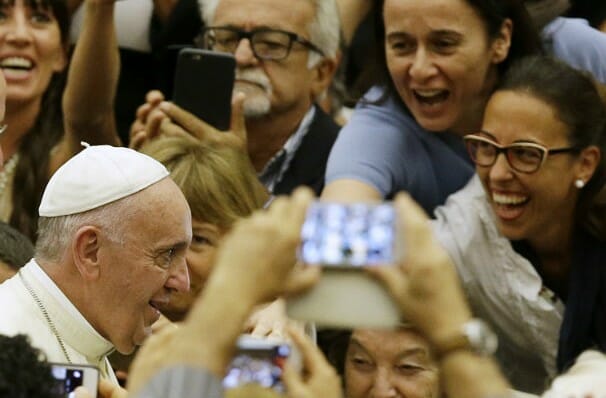
Sep 26, 2015 | Non categorizzato
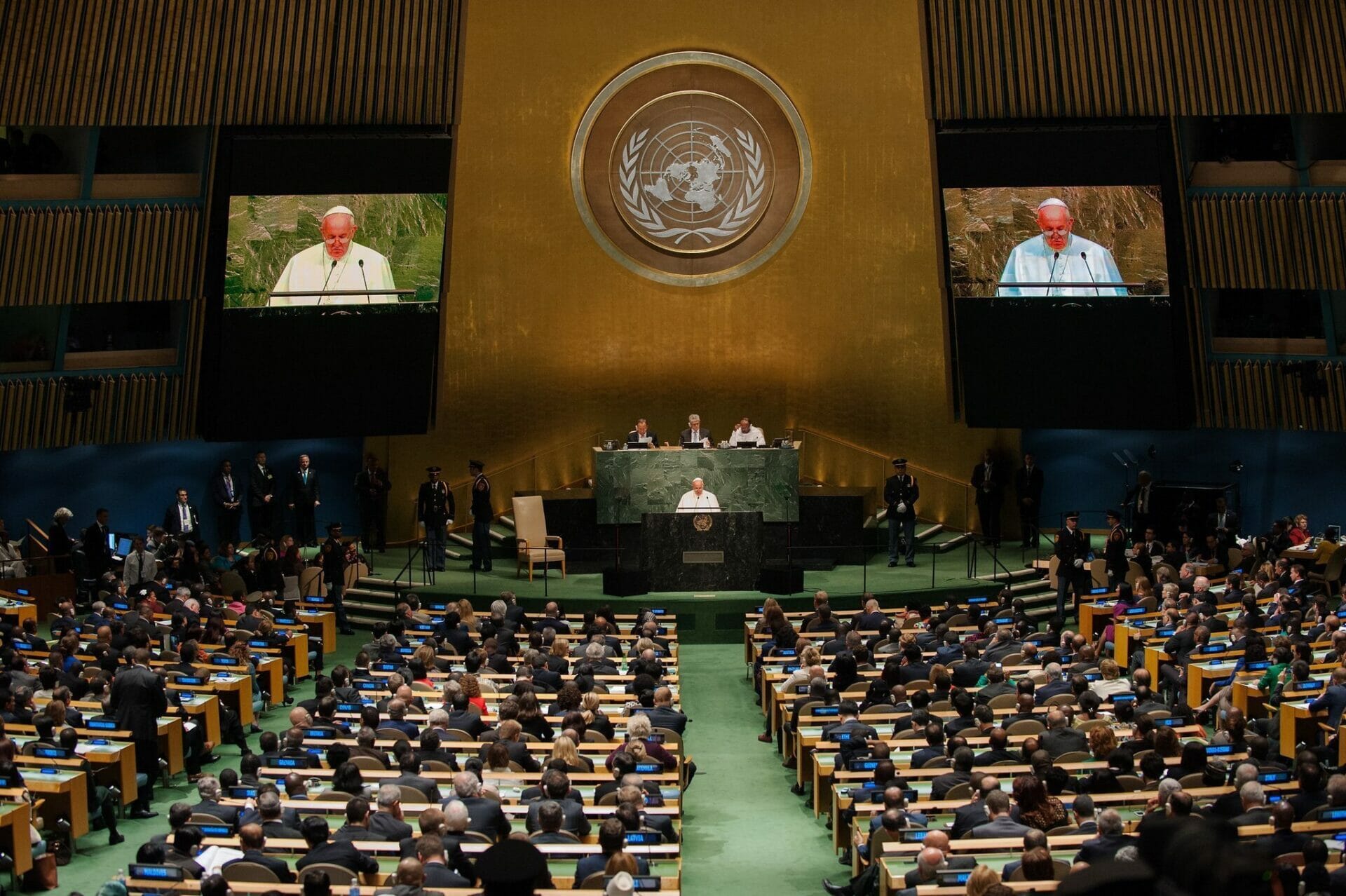 “Welcome, Holy Father” posters appeared all around the city already on Thursday. The taxi driver watching the Pope on TV was not indifferent: “So, you’re going to see the Pope tomorrow? Congratulations!” “Everyone finds the Pope appealing because he is authentic,” a non-Catholic man on the train said. He’s right: Francis does not need to attract attention or make himself appealing to all. And so he gave us a lesson before the UN’s General Assembly: on sustainable development, climate change and the issue of refugees: “We must not be appalled by the numbers… we have to look at their faces and listen to their stories,” he said in Washington. And at the UN: “Every man must be able to have concrete access to indispensible material and spiritual goods: a home, a dignified and well paid job, enough food, drinking water and religious freedom. ” He again strongly criticised drug trafficking, sexual exploitation of people, the arms rackets. In the same way as he had clearly denounced before the US Congress, he made another appeal to put aside divisions and antagonisms between political parties and to help the poor. The sacredness of each human being is a theme he strongly feels, and at the end of his speech, there were unending rounds of applause. He then left and greeted the people from his Fiat car which seemed so tiny amid the huge limousines.
“Welcome, Holy Father” posters appeared all around the city already on Thursday. The taxi driver watching the Pope on TV was not indifferent: “So, you’re going to see the Pope tomorrow? Congratulations!” “Everyone finds the Pope appealing because he is authentic,” a non-Catholic man on the train said. He’s right: Francis does not need to attract attention or make himself appealing to all. And so he gave us a lesson before the UN’s General Assembly: on sustainable development, climate change and the issue of refugees: “We must not be appalled by the numbers… we have to look at their faces and listen to their stories,” he said in Washington. And at the UN: “Every man must be able to have concrete access to indispensible material and spiritual goods: a home, a dignified and well paid job, enough food, drinking water and religious freedom. ” He again strongly criticised drug trafficking, sexual exploitation of people, the arms rackets. In the same way as he had clearly denounced before the US Congress, he made another appeal to put aside divisions and antagonisms between political parties and to help the poor. The sacredness of each human being is a theme he strongly feels, and at the end of his speech, there were unending rounds of applause. He then left and greeted the people from his Fiat car which seemed so tiny amid the huge limousines. 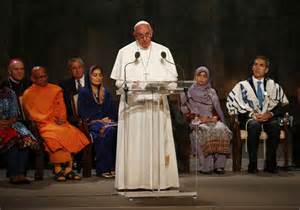 At Ground Zero, 500 representatives of various religions were all waiting to pray together for peace. Sue Kopp, a focolarina of New York who was able to participate in the rite, affirmed: “It was so meaningful also due to the diversity of this country. This place, which seemed so sacred to me, and marked by such immense suffering, has been transformed into a place of hope. The dream of a civilisation of love, is becoming a reality.”. Joe Klock, of New Humanity (an International NGO accredited at the UN) said; “The Pope underlined the importance of building unity in diversity, where peace and love reign among the nations and the hearts of all. This reality demonstrates that the world needs the spirituality of unity, which seems to be precisely tailored to this country!” Also in New York, the Pope visited some charitable organisations, among which a model school in Harlem. And then, in Central Park. The 80,000 lucky people were able to get entrance tickets, waited for hours, even to get just a glimpse of him. The Mass was celebrated at Madison Square Garden, where the seats are usually occupied by basketball stars and pop singers. The people waited for hours to enter but no one complained. Then the big surprise: Pope Francis arrived 20 minutes earlier than planned!
At Ground Zero, 500 representatives of various religions were all waiting to pray together for peace. Sue Kopp, a focolarina of New York who was able to participate in the rite, affirmed: “It was so meaningful also due to the diversity of this country. This place, which seemed so sacred to me, and marked by such immense suffering, has been transformed into a place of hope. The dream of a civilisation of love, is becoming a reality.”. Joe Klock, of New Humanity (an International NGO accredited at the UN) said; “The Pope underlined the importance of building unity in diversity, where peace and love reign among the nations and the hearts of all. This reality demonstrates that the world needs the spirituality of unity, which seems to be precisely tailored to this country!” Also in New York, the Pope visited some charitable organisations, among which a model school in Harlem. And then, in Central Park. The 80,000 lucky people were able to get entrance tickets, waited for hours, even to get just a glimpse of him. The Mass was celebrated at Madison Square Garden, where the seats are usually occupied by basketball stars and pop singers. The people waited for hours to enter but no one complained. Then the big surprise: Pope Francis arrived 20 minutes earlier than planned!  The altar, the chair and the pulpit were simply handcrafted . Cardinal Timothy Dolan had the impression that the Pope would have appreciated this more than if the items were made by a designer. And here, Francis became the pastor of the immense city, recalling the reading from the book of Isaiah 9.1: “The people walking in the darkness saw a great light.”. He spoke about the difficulties of the multicultural cities where the light is absent due to so much smog. “But Jesus walks down our streets today,” he said and continued to invite all to go out towards the others, with the heart of a “merciful father waiting for his children to come home.” The church is alive in the cities, the Pope stressed, and so Christians have to bear witness to the light of the Good News. The applause went on and on. As in all the other countries, also in the USA the Pope has touched the heart of each one of us.
The altar, the chair and the pulpit were simply handcrafted . Cardinal Timothy Dolan had the impression that the Pope would have appreciated this more than if the items were made by a designer. And here, Francis became the pastor of the immense city, recalling the reading from the book of Isaiah 9.1: “The people walking in the darkness saw a great light.”. He spoke about the difficulties of the multicultural cities where the light is absent due to so much smog. “But Jesus walks down our streets today,” he said and continued to invite all to go out towards the others, with the heart of a “merciful father waiting for his children to come home.” The church is alive in the cities, the Pope stressed, and so Christians have to bear witness to the light of the Good News. The applause went on and on. As in all the other countries, also in the USA the Pope has touched the heart of each one of us.
![Word of Life – October 2015]()
Sep 26, 2015 | Non categorizzato, Word of
 Listen to the Word of Life
Listen to the Word of Life
We can be like the first Christians and replicate their dramatic effect on society around them, if we live like them. For this we must focus on the Gospel’s core message and love one another in the power and the style of Jesus. Here we have the badge, the mark, the typical brand of Christians. Or at least it ought to be, because Jesus saw his community in this way. A fascinating text from Christianity’s early centuries, the Letter to Diognetus, recognizes that ‘Christians cannot be distinguished from the rest of the human race by country or language or customs. They do not live in cities of their own; they do not use a peculiar form of speech; they do not follow an eccentric manner of life.’ They are ordinary people, just the same as others. And yet they have a secret and it allows them to influence society profoundly, becoming as it were its ‘soul’ (see chs 5-6). It is a secret that Jesus passed on to his disciples shortly before dying. Like the ancient sages of Israel, like a father for his child, so too he, the Master of Wisdom, left as his legacy the art of knowing how to live and to live well. He had taken it directly from the Father: ‘I have made known to you everything that I have heard from my Father’ Jn 15:15), and it was the fruit of the relationship between them. It consisted in loving one another. This is his Last Will and Testament, the life of heaven that he brought to earth, which he shares with us so that it can become our very own life. He wants this to be the identity of his disciples, who should be recognizable as his followers by their mutual love: ‘By this everyone will know that you are my disciples, if you have love for one another.’ Are Jesus’s disciples recognized by their mutual love? ‘The history of the Church is a history of holiness’ wrote John Paul II. Nonetheless ‘history also records events which constitute a counter-testimony to Christianity’ (Incarnationis Mysterium, 11). For centuries, in the name of Jesus, Christians have fought endless wars with one another and their divisions continue. There are people who still today associate Christians with the Crusades, with the Inquisition, or who see them as the defenders to the bitter end of an outdated morality, and as opposing the progress of science. It was not like that for the new-born community of the first Christians in Jerusalem. People admired the communion of goods they practised, the unity that reigned among them, the ‘glad and generous hearts’ that characterized them (see Acts 2:46). In the Acts of the Apostles we read that ‘the people held them in high esteem’ so that more and more ‘believers were added to the Lord, great numbers of both men and women’ (Acts 5:13-14). The living witness of the community had a powerful attraction. Why today are we not known as people who stand out because of their love? What have we done with the commandment of Jesus? ‘By this everyone will know that you are my disciples, if you have love for one another.’ Traditionally, in Roman Catholic circles, the month of October is dedicated to mission, to reflecting upon the command of Jesus to go into all the world and proclaim the Gospel, to pray for and support those who are in the frontline. This Word of Life could be a help for all to put into focus the fundamental dimension of every Christian proclamation. It is not about imposing faith on others, nor proselytism, nor a self-serving handout of aid to the poor so that they will be converted. Neither is it primarily a matter of the challenge to defend moral values or a firm stand against injustice and war, even though such stances are a duty the Christian cannot evade. Before all else the Christian proclamation is a witness of life that every disciple of Jesus must offer personally. People in the modern world ‘listen more willingly to witnesses than to teachers’ (Evangelii Nuntiandi, 41). Even persons hostile to the Church are often touched by the example of those who dedicate their lives to the sick and the poor and who are ready to leave their homelands, going far away to the toughest places and offering help and solidarity to those in most need. But above all the witness Jesus requires is that of a whole community which demonstrates the truth of the Gospel. It must show that the life he brought really can generate a new society, where we live genuinely as brothers and sisters, helping and serving one another, collectively attentive to the most fragile and needy. The life of the Church has seen these kinds of witness, such as the settlements for indigenous peoples built by Franciscans and Jesuits in South America, or monasteries with the townships that grew up around them. Today too ecclesial Movements and communities give life to little towns of witness where it is possible to see signs of a new society, the fruit of Gospel life, of mutual love. ‘By this everyone will know that you are my disciples, if you have love for one another.’ Without abandoning our homes and the persons we know, if among us we live that unity which Jesus gave his life for, we can create an alternative way of living and sow seeds of hope and new life around us. A family that every day renews their will to live mutual love in a practical way can become a ray of light in the mutual indifference of a housing block or a district. An ‘environmental cell’, in other words two or more persons who agree to put into practice the demands of the Gospel with total commitment – in the field of their work, at school, in local government offices, in administrative buildings, in a prison – will cut through the logic of the struggle for power and create a collaborative atmosphere that favours the birth of true fraternity, a fraternity previously unhoped-for. Did not the first Christians behave like this at the time of the Roman Empire? Is not this the way they spread the transformative new life of Christianity? In our own day it is we who are the ‘first Christians’, called, as they were, to forgive one another, to see each other as always new, to help one another – in a word, to love one another with the intensity that Jesus loved us, in the certainty that his presence in our midst has the strength to draw others too into the divine logic of love. Fabio Ciardi
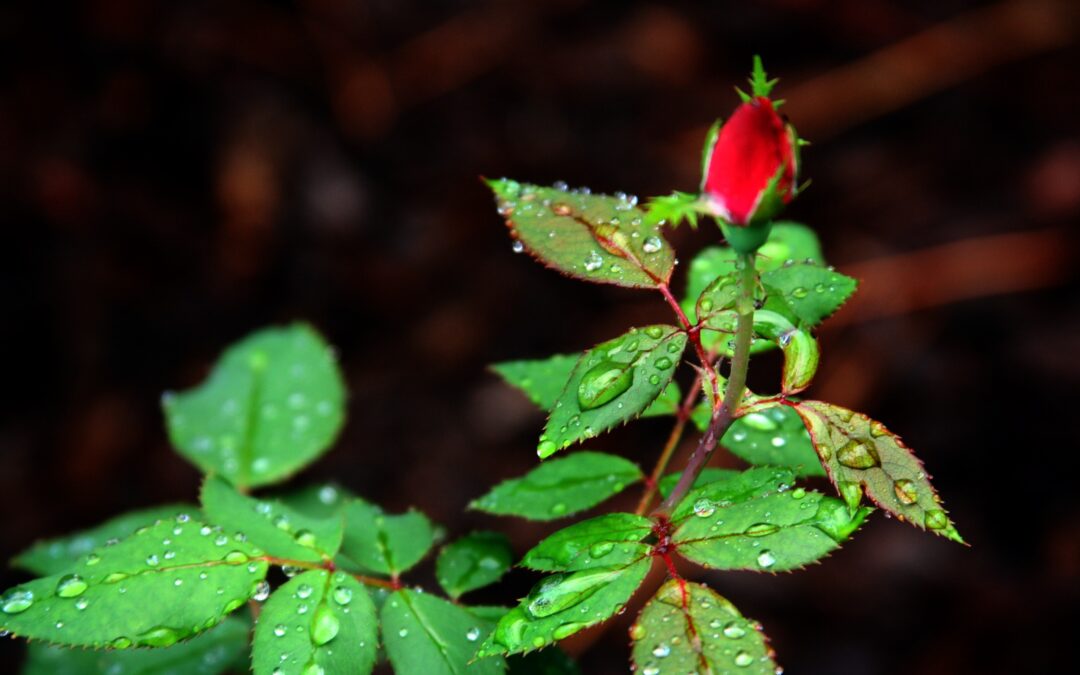
Sep 26, 2015 | Non categorizzato
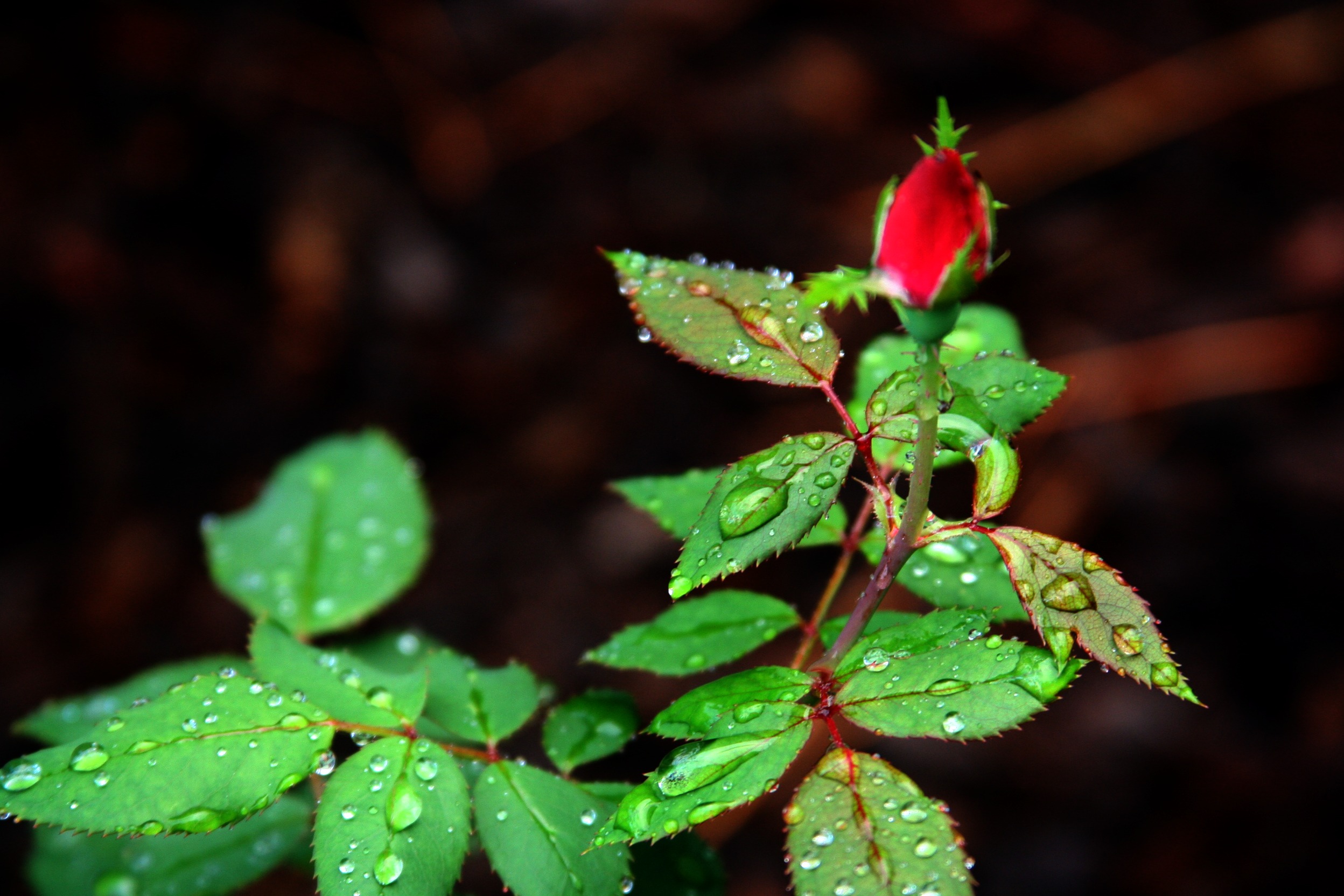 A missing son “My son, in the critical age of adolescence, and probably due to bad company, disappeared without giving any news of himself. In the evening I would go and look for him among the vagabonds. My desperation created misunderstandings with my husband, and I was running the risk of neglecting not only him but also my two other sons. One day, I recounted that during my search around town, I had met many young people who were alone, and who had been reduced to living on the streets due to drug addiction. My other sons offered to come with me to take food and clothing. Since then, life in the family has changed. That tragedy was really an eye opener.” (M. J. – Switzerland) The hospital “The critically ill patient next to my bed confided to me that he was an agnostic and that he hoped to die soon. I listened to him lengthily and then I felt I had to say to him: ‘I think that our task as human beings is to value life at every stage, whether we are healthy (employed or with other commitments), or sick (with our therapies, pains, in our relationships with the nurses, relatives and the other patients). Death, however, may come, but we shall be what we have done in life and valuing the life we have received.’ The other patient seems to be serene now. In the evening, he who was always brooding even welcomed his daughter with a smile. I think he will sleep better tonight.” (D.B. – Trent, Italy) Prison visit “Rosa had to go the next day to teach in a military jail that was out of the way and did not have a car. I offered to accompany her, and moved some of my various commitments. The next day, on the way I tried to reassure my friend: I would make use of my time waiting outside the jail to say a prayer for her. So I did, while she was inside. After a few hours, I saw her come out all smiles due to the relationship she had established with the new students; she had felt my support through prayers. Now she goes to the jail on her own, but still treasures the experience we lived together.” (C. D. – Campania, Italy) The soldier of the Presidential guards “Corneille is a student at Kinshasha University. Last week he was there, in front of the faculty together with his friends, when a soldier of the Presidential guards approached them and begged for help for his child who was seriously ill. The students looked at one another, their hands in their pockets. Also Corneille put his hands in his pocket, and fumbled with: in the left pocket, the leaflet with the Word of Life, and in the right, some coins. After a moment’s hesitation, he offered the money to the soldier. When they were alone again, his friends said: ‘You must be mad, giving your money to him, above all!’ So Corneille gave them the Word of Life. They read it and one of them said: ‘You are really a coherent person. I like that.’ ((C. – Democratic Republic of Congo )
A missing son “My son, in the critical age of adolescence, and probably due to bad company, disappeared without giving any news of himself. In the evening I would go and look for him among the vagabonds. My desperation created misunderstandings with my husband, and I was running the risk of neglecting not only him but also my two other sons. One day, I recounted that during my search around town, I had met many young people who were alone, and who had been reduced to living on the streets due to drug addiction. My other sons offered to come with me to take food and clothing. Since then, life in the family has changed. That tragedy was really an eye opener.” (M. J. – Switzerland) The hospital “The critically ill patient next to my bed confided to me that he was an agnostic and that he hoped to die soon. I listened to him lengthily and then I felt I had to say to him: ‘I think that our task as human beings is to value life at every stage, whether we are healthy (employed or with other commitments), or sick (with our therapies, pains, in our relationships with the nurses, relatives and the other patients). Death, however, may come, but we shall be what we have done in life and valuing the life we have received.’ The other patient seems to be serene now. In the evening, he who was always brooding even welcomed his daughter with a smile. I think he will sleep better tonight.” (D.B. – Trent, Italy) Prison visit “Rosa had to go the next day to teach in a military jail that was out of the way and did not have a car. I offered to accompany her, and moved some of my various commitments. The next day, on the way I tried to reassure my friend: I would make use of my time waiting outside the jail to say a prayer for her. So I did, while she was inside. After a few hours, I saw her come out all smiles due to the relationship she had established with the new students; she had felt my support through prayers. Now she goes to the jail on her own, but still treasures the experience we lived together.” (C. D. – Campania, Italy) The soldier of the Presidential guards “Corneille is a student at Kinshasha University. Last week he was there, in front of the faculty together with his friends, when a soldier of the Presidential guards approached them and begged for help for his child who was seriously ill. The students looked at one another, their hands in their pockets. Also Corneille put his hands in his pocket, and fumbled with: in the left pocket, the leaflet with the Word of Life, and in the right, some coins. After a moment’s hesitation, he offered the money to the soldier. When they were alone again, his friends said: ‘You must be mad, giving your money to him, above all!’ So Corneille gave them the Word of Life. They read it and one of them said: ‘You are really a coherent person. I like that.’ ((C. – Democratic Republic of Congo )
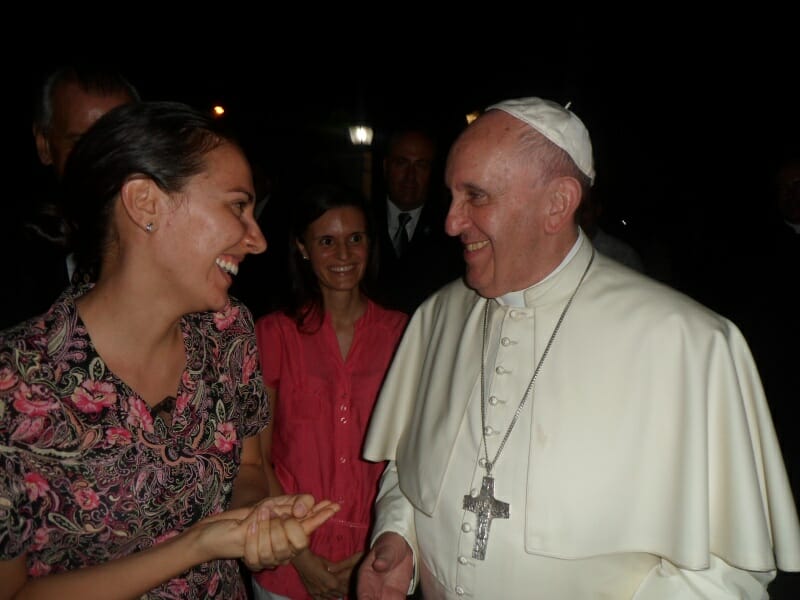
Sep 24, 2015 | Non categorizzato
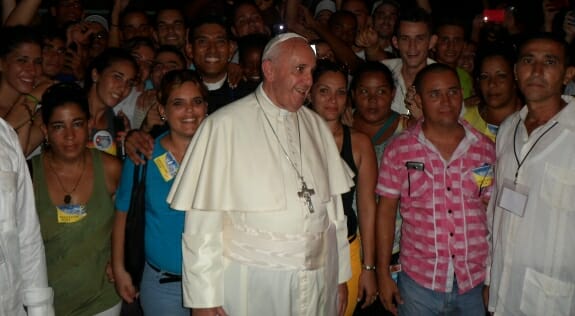 “We strongly felt the dream of a “united world” during these days of grace due to the presence of Pope Francis in Cuba. His visit literally left a trail of light! Already the preparations were full of enthusiasm and novelties. In the three dioceses he would visit, the entire communities of the Church started up various initiatives: in the churches and the “mission houses,” groups of young people held meetings in parks, and around the neighbourhood to talk about the Pope – in short, it was a happy and expectant Church! And, as never before, the means of communication (of the state) offered an extensive footage to prepare the Cuban people for this important visit – also from the political point of view, due to the known role the Pope played in reestablishing relationships between Cuba and the United States. The radios, TV stations and press continually announced the visit, with small “catecheses” on the Pope and the Church documentaries on his life, and also that of the other two Popes who had visited the Island. It was surprise and joy for a Church that had for years been isolated by the lack of the means of communication for so many years!» “The Pope arrived like a “missionary of mercy,” with simple words and gestures – often gentle but impressive – he told the Cubans and the whole world that without forgiveness, without practising the culture of encounter and dialogue, it would be impossible to hope for the future. With his very first words he immediately opened new horizons: “Geographically, Cuba is an archipelago that plays an extraordinary key role between the north and south and between east and west. Its natural vocation is to be a meeting point so that all peoples can be united by friendship (…). We are testimonials of an event that has filled us with hope: the process of the normalisation of relationships between two peoples, after years of estrangement. It is a sign of the victory of the culture of encounter and dialogue.” He invited all to “continue to progress on this path and develop all its potentials, as proof of the important service in favour of peace and the wellbeing of its people and the entire America, as an example of reconciliation for the whole world.” In the Mass in Plaza de la Revolución in Havana, he also said: “…authentic life is lived through the concrete commitment toward one’s neighbour, through one’s service,” recalling above all the service of the weakest among brethren. “We are all called due to our Christian vocation to serving others and helping one another not to fall into the temptation of practicing a service that exploits others,” he warned.
“We strongly felt the dream of a “united world” during these days of grace due to the presence of Pope Francis in Cuba. His visit literally left a trail of light! Already the preparations were full of enthusiasm and novelties. In the three dioceses he would visit, the entire communities of the Church started up various initiatives: in the churches and the “mission houses,” groups of young people held meetings in parks, and around the neighbourhood to talk about the Pope – in short, it was a happy and expectant Church! And, as never before, the means of communication (of the state) offered an extensive footage to prepare the Cuban people for this important visit – also from the political point of view, due to the known role the Pope played in reestablishing relationships between Cuba and the United States. The radios, TV stations and press continually announced the visit, with small “catecheses” on the Pope and the Church documentaries on his life, and also that of the other two Popes who had visited the Island. It was surprise and joy for a Church that had for years been isolated by the lack of the means of communication for so many years!» “The Pope arrived like a “missionary of mercy,” with simple words and gestures – often gentle but impressive – he told the Cubans and the whole world that without forgiveness, without practising the culture of encounter and dialogue, it would be impossible to hope for the future. With his very first words he immediately opened new horizons: “Geographically, Cuba is an archipelago that plays an extraordinary key role between the north and south and between east and west. Its natural vocation is to be a meeting point so that all peoples can be united by friendship (…). We are testimonials of an event that has filled us with hope: the process of the normalisation of relationships between two peoples, after years of estrangement. It is a sign of the victory of the culture of encounter and dialogue.” He invited all to “continue to progress on this path and develop all its potentials, as proof of the important service in favour of peace and the wellbeing of its people and the entire America, as an example of reconciliation for the whole world.” In the Mass in Plaza de la Revolución in Havana, he also said: “…authentic life is lived through the concrete commitment toward one’s neighbour, through one’s service,” recalling above all the service of the weakest among brethren. “We are all called due to our Christian vocation to serving others and helping one another not to fall into the temptation of practicing a service that exploits others,” he warned. 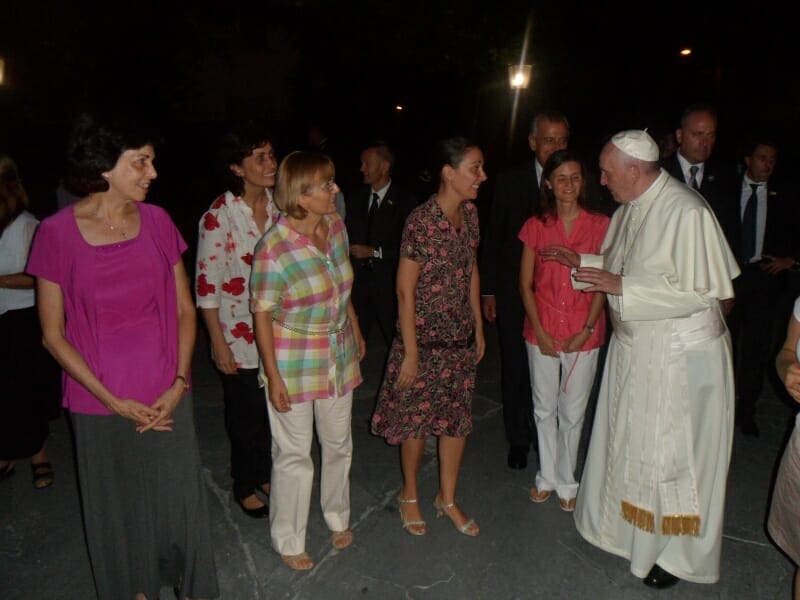 In his meeting with the youth, the empathy was immediate. To the wish expressed by one of them, of “not wanting to present only their dreams, but of requesting something special that could revive hope…,” Francis answered firmly, “Continue dreaming, because if you offer the best of yourself, you will help the world to be different. Don’t forget: go on dreaming! Dream and recount your dreams. Talk about them since the big endeavours have to be told!”
In his meeting with the youth, the empathy was immediate. To the wish expressed by one of them, of “not wanting to present only their dreams, but of requesting something special that could revive hope…,” Francis answered firmly, “Continue dreaming, because if you offer the best of yourself, you will help the world to be different. Don’t forget: go on dreaming! Dream and recount your dreams. Talk about them since the big endeavours have to be told!”  “Many of us – they continued – had the chance to greet him personally, starting not only from the focolarine working in the Nunciature, but also the families, and the youth in the various cities he visited.” The Focolare has been in Cuba since 1998 and the service it tries to offer the Church and society is that of weaving a network of fraternity, bringing “social friendship” which the Pope presented to the youth and to favour “the culture of encounter,” to pursue as a journey of hope. “Many of us were part of the service staff, before and after the visit: some helped the media in organising the events, some gave interviews on the national and international media, or simply stayed in their places along the route the Pope would take, to greet him. In line with our vocation of unity, together with believers and agnostics, we lived and participated in these days of grace.” In the Sanctuary of Our Lady of Charit, Pope Francis left us with a programme: “We want to be a Church that goes out from its homes to build bridges, demolish walls and sow reconciliation. Like Mary, we want to be a Church that is able to walk with its people in difficult situations, committing ourselves with our lives, our culture, society, and not isolating ourselves, but walking alongside our brethren. All together, all together.”
“Many of us – they continued – had the chance to greet him personally, starting not only from the focolarine working in the Nunciature, but also the families, and the youth in the various cities he visited.” The Focolare has been in Cuba since 1998 and the service it tries to offer the Church and society is that of weaving a network of fraternity, bringing “social friendship” which the Pope presented to the youth and to favour “the culture of encounter,” to pursue as a journey of hope. “Many of us were part of the service staff, before and after the visit: some helped the media in organising the events, some gave interviews on the national and international media, or simply stayed in their places along the route the Pope would take, to greet him. In line with our vocation of unity, together with believers and agnostics, we lived and participated in these days of grace.” In the Sanctuary of Our Lady of Charit, Pope Francis left us with a programme: “We want to be a Church that goes out from its homes to build bridges, demolish walls and sow reconciliation. Like Mary, we want to be a Church that is able to walk with its people in difficult situations, committing ourselves with our lives, our culture, society, and not isolating ourselves, but walking alongside our brethren. All together, all together.”
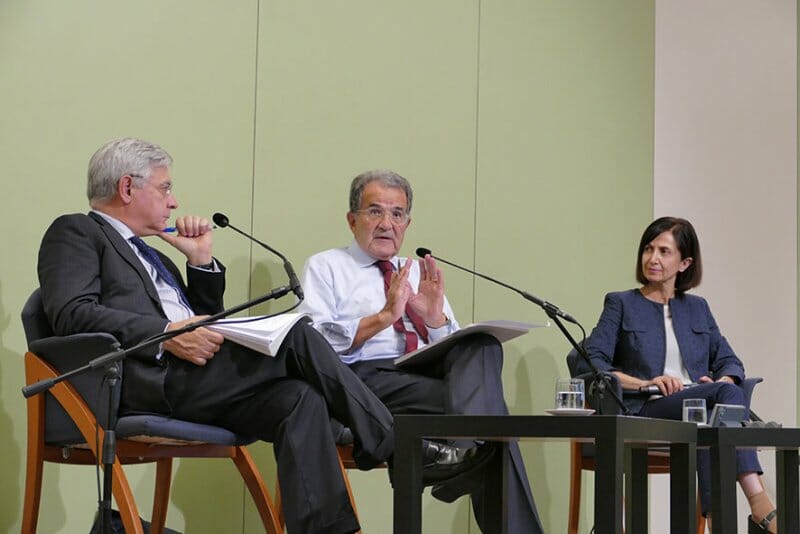
Sep 24, 2015 | Non categorizzato
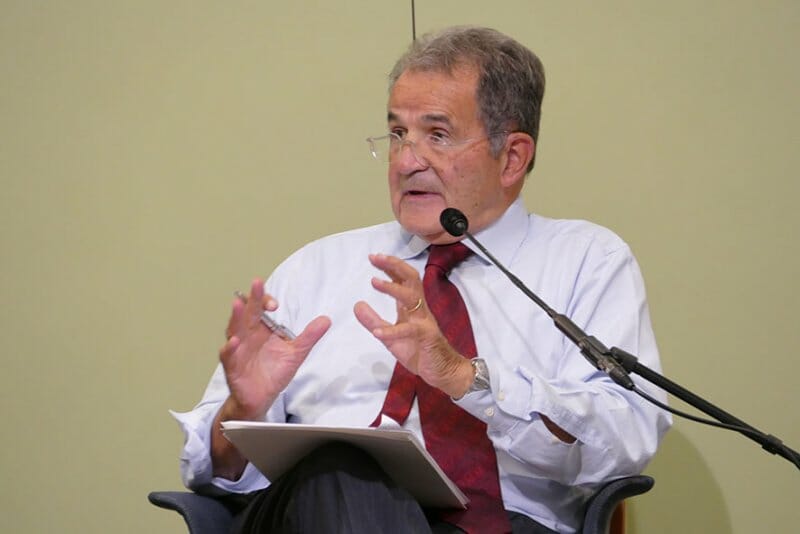 “We can react to this situation through forms of reorganization, even if they are not perfect, but which bring together countries and people from various fields. Our problem in Europe is one of an imperfect unity, but we must keep going with it. And in the context of the migrant crisis we feel that unity is essential to our future,” states Roman Prodi, twice Prime Minister of Italy and former President of the European Commission. As an economist, academic and politician, he gave an interview during the meeting for Focolare regional delegates. He continues, “We must build up reasons for hope in ways that will be different in different parts of the world. We need energy that comes from the base. Instead, in the Middle East we need the major world powers to dialogue with each other because otherwise nothing will be resolved.” The interview took place on 21 September, at the Mariapolis Centre in Castel Gandolfo, during the second week of the convention. The session was entitled: The world is tending towards unity: a socio-political viewpoint. While the subject matter is complex, it’s very much in tune with, and integrated into, the theme of unity which is the focus this year for the Focolare Movement and which has been dealt with throughout the program.
“We can react to this situation through forms of reorganization, even if they are not perfect, but which bring together countries and people from various fields. Our problem in Europe is one of an imperfect unity, but we must keep going with it. And in the context of the migrant crisis we feel that unity is essential to our future,” states Roman Prodi, twice Prime Minister of Italy and former President of the European Commission. As an economist, academic and politician, he gave an interview during the meeting for Focolare regional delegates. He continues, “We must build up reasons for hope in ways that will be different in different parts of the world. We need energy that comes from the base. Instead, in the Middle East we need the major world powers to dialogue with each other because otherwise nothing will be resolved.” The interview took place on 21 September, at the Mariapolis Centre in Castel Gandolfo, during the second week of the convention. The session was entitled: The world is tending towards unity: a socio-political viewpoint. While the subject matter is complex, it’s very much in tune with, and integrated into, the theme of unity which is the focus this year for the Focolare Movement and which has been dealt with throughout the program.  Together with Romano Prodi at the interview was session was Pasquale Ferrara, a diplomat, Secretary-General of the European University Institute in Florence, who is involved in academic activities and research in the field of international relations. He commented, “One point we should reflect on is that globalization has positive effects. The problem about globalisation is that it is not universal. Globalisation is about seeking to extend one economic model, liberal economics, to the whole world. On the political level it is the effort to spread liberal democracy.” He went on to invite everyone to “listen to the needs of all peoples in the world” because “peoples can’t be categorised into Series A and Series B. There can’t be members of the Security Council and then all the rest. We must take account of all the needs expressed by all peoples.” The solution he proposed: “To start from the foundations, building up civil and international society. We have too much trust in institutions, governments, organizations and authorities, which are of course important. But in many situations, especially in societies that are internally divided in their own countries, and which need to work through processes of reconciliation for example, it is vital that this work starts from interpersonal and inter-community relations. Those who do this should know that they are actually doing actually political, civil, social and institutional reconstruction.” The dialogue session, held in the presence of audience composed of representatives from the whole world, was stimulating. Each of those present had their own expectations, challenges and inner resources. The two political experts were able to give documented insights into the current global socio-political situation, which is both complex and ever-changing. It was a contribution which enriched the reflection deeply felt by those who embrace the ideals of the Focolare Movement and who wish to work towards universal brotherhood and the building peace.
Together with Romano Prodi at the interview was session was Pasquale Ferrara, a diplomat, Secretary-General of the European University Institute in Florence, who is involved in academic activities and research in the field of international relations. He commented, “One point we should reflect on is that globalization has positive effects. The problem about globalisation is that it is not universal. Globalisation is about seeking to extend one economic model, liberal economics, to the whole world. On the political level it is the effort to spread liberal democracy.” He went on to invite everyone to “listen to the needs of all peoples in the world” because “peoples can’t be categorised into Series A and Series B. There can’t be members of the Security Council and then all the rest. We must take account of all the needs expressed by all peoples.” The solution he proposed: “To start from the foundations, building up civil and international society. We have too much trust in institutions, governments, organizations and authorities, which are of course important. But in many situations, especially in societies that are internally divided in their own countries, and which need to work through processes of reconciliation for example, it is vital that this work starts from interpersonal and inter-community relations. Those who do this should know that they are actually doing actually political, civil, social and institutional reconstruction.” The dialogue session, held in the presence of audience composed of representatives from the whole world, was stimulating. Each of those present had their own expectations, challenges and inner resources. The two political experts were able to give documented insights into the current global socio-political situation, which is both complex and ever-changing. It was a contribution which enriched the reflection deeply felt by those who embrace the ideals of the Focolare Movement and who wish to work towards universal brotherhood and the building peace.
Video in Italian – transcript in English https://vimeo.com/140062041
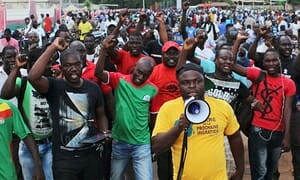
Sep 23, 2015 | Focolare Worldwide
 “Ever since the coup d’etat last Thursday, 17 September– we are all still at home: the schools, offices, and shops are all closed. Petrol and food are running out and whatever is available, costs double,” explains Aurora De Oliveira of the Focolare in Bobo-Dioulasso, the second city of Burkina Faso. The protest here is felt, but not as strongly as in the capital, Ouagadougou (population of 1.5 million), where the main events of last week came about and where more than 100 people were wounded and at least ten have died. “These are determined people who do not wish to be crushed. In the big cities of Burkina Faso everyone participated in demonstrations, but peaceful ones. Undoubtedly, all are afraid, since war could explode any time now.” Jacques Sawadogo of the focolare community in the capital wrote: “The activities in Ouaga – where the army came – have slowed down. The banks, shops and stations have closed. Only small self-supporting activities have continued, like those of the Movement’s members in Ouagadougou. We try to keep contact via e-mail or telephone. We are trying our best to be peacemakers in words and actions.” We spoke on the phone also with Fr. Sylvestre Sanou, general vicar of the diocese of Bobo-Dioulasso. The situation is in constant evolution and we fear it may degenerate. “There’s a general strike throughout the country – Fr. Sylvestre continued – In reality it was not really a coup d’etat. It was a raid conducted by a small group of the Presidential Guards headed by General Diendéré, a close ally of former president, Blaise Compaoré, who rose to power in 1987 with a small coup d’etat and was forced to escape after 27 years, and only in October 2014, after days of protests. Since then he has taken refuge in the Ivory Coast. “It seems that Generale Diendéré has tried to negotiate for his immunity, after having been President Compaoré’s right-hand man.” We are, therefore, not dealing with a religious conflict between Muslims (50%), Christians (30%) or Traditional Religions (20%) but with a political situation. “The army seems to side with the population and the governors of the various regions are also against “coups,” and even Diendéré’s house was burnt down. Violence generates violence,” Fr. Sylvestre continued. “On 22 September we were all holding our breaths for the ultimatum of the army which entered the capital from four cities. The political future of the country is uncertain, despite the mediation of the Presidents of Benin and Senegal, on behalf of the Economic Community of West African States (CEDEAO) and the return of the transitory President of Burkina Faso, Michel Kafando and also the Prime Minister, Isaac Zida (arrested and then released).” “I had just returned from a stay in the Mariapolis “Victoria,” the town of the Focolare Movement in the Ivory Coast, and found myself in this situation,” concluded Fr. Sanou. ”They blocked the undergoing process of dialogue between the political parties which had tried to find common ground. But all blew up. Let us pray that a solution emerges without bloodshed and also quickly. In the meantime, we have started with the priests, religious and catechists of the diocese and also with our bishop, the pastoral visits programmed before these events. We feel the importance of going ahead and praying for our people and our country.” “How are we all taking this? At the start we were angry and disappointed– Aurora De Oliveira confided – since after the 2014 events the political situation was coming along well. Just a step away from elections, programmed for 11 October (and now moved to 22 November), and here comes an armed group to spoil it all. This was my first reaction, and we felt the need to protest. The next step was to see in this suffering the countenance of Jesus Forsaken, and thus try to strengthen unity among us all in order to transmit peace and forgiveness. We tried to contact all those who share our spirituality of unity, because love must overcome all.” While the meeting in Rome of delegates of the Movement from all over the world has started, and makes the hopes and sufferings of people all over the world particularly felt, the President of the Focolare, Maria Voce wrote to the community of Burkina Faso: “We shall continue to pray and live in greater unity with all of you, certain that Mary will protect us all.” https://vimeo.com/140074710
“Ever since the coup d’etat last Thursday, 17 September– we are all still at home: the schools, offices, and shops are all closed. Petrol and food are running out and whatever is available, costs double,” explains Aurora De Oliveira of the Focolare in Bobo-Dioulasso, the second city of Burkina Faso. The protest here is felt, but not as strongly as in the capital, Ouagadougou (population of 1.5 million), where the main events of last week came about and where more than 100 people were wounded and at least ten have died. “These are determined people who do not wish to be crushed. In the big cities of Burkina Faso everyone participated in demonstrations, but peaceful ones. Undoubtedly, all are afraid, since war could explode any time now.” Jacques Sawadogo of the focolare community in the capital wrote: “The activities in Ouaga – where the army came – have slowed down. The banks, shops and stations have closed. Only small self-supporting activities have continued, like those of the Movement’s members in Ouagadougou. We try to keep contact via e-mail or telephone. We are trying our best to be peacemakers in words and actions.” We spoke on the phone also with Fr. Sylvestre Sanou, general vicar of the diocese of Bobo-Dioulasso. The situation is in constant evolution and we fear it may degenerate. “There’s a general strike throughout the country – Fr. Sylvestre continued – In reality it was not really a coup d’etat. It was a raid conducted by a small group of the Presidential Guards headed by General Diendéré, a close ally of former president, Blaise Compaoré, who rose to power in 1987 with a small coup d’etat and was forced to escape after 27 years, and only in October 2014, after days of protests. Since then he has taken refuge in the Ivory Coast. “It seems that Generale Diendéré has tried to negotiate for his immunity, after having been President Compaoré’s right-hand man.” We are, therefore, not dealing with a religious conflict between Muslims (50%), Christians (30%) or Traditional Religions (20%) but with a political situation. “The army seems to side with the population and the governors of the various regions are also against “coups,” and even Diendéré’s house was burnt down. Violence generates violence,” Fr. Sylvestre continued. “On 22 September we were all holding our breaths for the ultimatum of the army which entered the capital from four cities. The political future of the country is uncertain, despite the mediation of the Presidents of Benin and Senegal, on behalf of the Economic Community of West African States (CEDEAO) and the return of the transitory President of Burkina Faso, Michel Kafando and also the Prime Minister, Isaac Zida (arrested and then released).” “I had just returned from a stay in the Mariapolis “Victoria,” the town of the Focolare Movement in the Ivory Coast, and found myself in this situation,” concluded Fr. Sanou. ”They blocked the undergoing process of dialogue between the political parties which had tried to find common ground. But all blew up. Let us pray that a solution emerges without bloodshed and also quickly. In the meantime, we have started with the priests, religious and catechists of the diocese and also with our bishop, the pastoral visits programmed before these events. We feel the importance of going ahead and praying for our people and our country.” “How are we all taking this? At the start we were angry and disappointed– Aurora De Oliveira confided – since after the 2014 events the political situation was coming along well. Just a step away from elections, programmed for 11 October (and now moved to 22 November), and here comes an armed group to spoil it all. This was my first reaction, and we felt the need to protest. The next step was to see in this suffering the countenance of Jesus Forsaken, and thus try to strengthen unity among us all in order to transmit peace and forgiveness. We tried to contact all those who share our spirituality of unity, because love must overcome all.” While the meeting in Rome of delegates of the Movement from all over the world has started, and makes the hopes and sufferings of people all over the world particularly felt, the President of the Focolare, Maria Voce wrote to the community of Burkina Faso: “We shall continue to pray and live in greater unity with all of you, certain that Mary will protect us all.” https://vimeo.com/140074710

Sep 22, 2015 | Non categorizzato
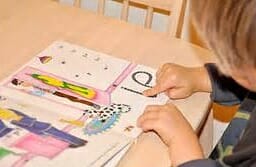 “I accepted this assignment in order to make concrete my choice to live the spirituality of unity, staying connected with other politicians who, like me, commit themselves to seek the common good and to make brotherhood emerge as a political category.” These are the words of Maria Elena Loschiavo, Deputy Mayor responsible for social politics and schools, in a municipality of just over 7,000 inhabitants. The past scholastic year several children and teens who exhibit learning disabilities and who, for various reasons, cannot depend on their families for support, were brought to her attention. “I wanted to invent something for them, but the friends of the Administration reminded me that there were no resources. So I discussed the matter with my husband, and then I spoke with friends and colleagues who are retired, and I called some young people I know. I immediately had at my disposition a good group of people from various cultures and religious traditions. Talking with them, we got the idea for an after-school program, every afternoon, from 3 to 5 pm. It was a bit of a gamble because starting something means carrying it through to the finish. It also means saying goodbye, for months and months, to our afternoon rest time. But we wanted to try, we wanted to enter the hearts of families who feel marginalized.” As soon as the town announcement was made public, many requests arrived, but the limit was 25 students. “For each one of them, there is a story, with troubling family situations which unfortunately do not help their inclusion in the learning process. We barely had time to organize ourselves, and then on March 9th, with great enthusiasm, we began: in a rather naïve way, without knowing exactly what we would encounter. But in the end the results were certainly visible! From the families, who strongly ask that the experiment be repeated next year, and especially from the children and teens.” “As the municipal administrator of a small town, I must admit that creating a team of people who are willing to give, is not easy to do. But neither is it impossible. It has certainly been exciting to see how each person in the group has accepted the chance to work together to love these young people, giving them a piece of his own life. We experienced together that freely giving is a difficult path to take, but it makes you feel you are building universal brotherhood, starting from the town where you live.”
“I accepted this assignment in order to make concrete my choice to live the spirituality of unity, staying connected with other politicians who, like me, commit themselves to seek the common good and to make brotherhood emerge as a political category.” These are the words of Maria Elena Loschiavo, Deputy Mayor responsible for social politics and schools, in a municipality of just over 7,000 inhabitants. The past scholastic year several children and teens who exhibit learning disabilities and who, for various reasons, cannot depend on their families for support, were brought to her attention. “I wanted to invent something for them, but the friends of the Administration reminded me that there were no resources. So I discussed the matter with my husband, and then I spoke with friends and colleagues who are retired, and I called some young people I know. I immediately had at my disposition a good group of people from various cultures and religious traditions. Talking with them, we got the idea for an after-school program, every afternoon, from 3 to 5 pm. It was a bit of a gamble because starting something means carrying it through to the finish. It also means saying goodbye, for months and months, to our afternoon rest time. But we wanted to try, we wanted to enter the hearts of families who feel marginalized.” As soon as the town announcement was made public, many requests arrived, but the limit was 25 students. “For each one of them, there is a story, with troubling family situations which unfortunately do not help their inclusion in the learning process. We barely had time to organize ourselves, and then on March 9th, with great enthusiasm, we began: in a rather naïve way, without knowing exactly what we would encounter. But in the end the results were certainly visible! From the families, who strongly ask that the experiment be repeated next year, and especially from the children and teens.” “As the municipal administrator of a small town, I must admit that creating a team of people who are willing to give, is not easy to do. But neither is it impossible. It has certainly been exciting to see how each person in the group has accepted the chance to work together to love these young people, giving them a piece of his own life. We experienced together that freely giving is a difficult path to take, but it makes you feel you are building universal brotherhood, starting from the town where you live.”  In October, the project begins again, this time with new developments, but still at zero cost, both for the administration and for the users. “In this second year,” explains M. Elena, “we can count on a greater number of teachers and therefore a greater number of children who can access the program. The location will be at the school, which facilitates working in synergy with the teacher of the class, who can observe each child’s difficulty, allowing us to immediately begin working to solve the problem. Thanks to the volunteer work we can avail ourselves of a medical-psycho-pedagogical laboratory. The teens will have recreational time (in our town there are many talents, great and small, in the fields of animation, painting, dance, etc…) and for the mothers there will be a yoga class each week. And with the support of the Athletic Associations in the area, there will be activities for motor development education. ” “The ideas that are being fulfilled here are many, but I am sure that many others will come, because as someone told me one day, in the field of solidarity it’s enough to take the first step. Then solidarity itself will guide the next ones.”
In October, the project begins again, this time with new developments, but still at zero cost, both for the administration and for the users. “In this second year,” explains M. Elena, “we can count on a greater number of teachers and therefore a greater number of children who can access the program. The location will be at the school, which facilitates working in synergy with the teacher of the class, who can observe each child’s difficulty, allowing us to immediately begin working to solve the problem. Thanks to the volunteer work we can avail ourselves of a medical-psycho-pedagogical laboratory. The teens will have recreational time (in our town there are many talents, great and small, in the fields of animation, painting, dance, etc…) and for the mothers there will be a yoga class each week. And with the support of the Athletic Associations in the area, there will be activities for motor development education. ” “The ideas that are being fulfilled here are many, but I am sure that many others will come, because as someone told me one day, in the field of solidarity it’s enough to take the first step. Then solidarity itself will guide the next ones.”
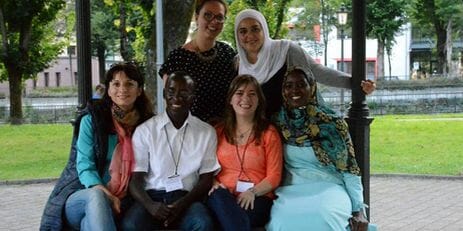
Sep 21, 2015 | Non categorizzato
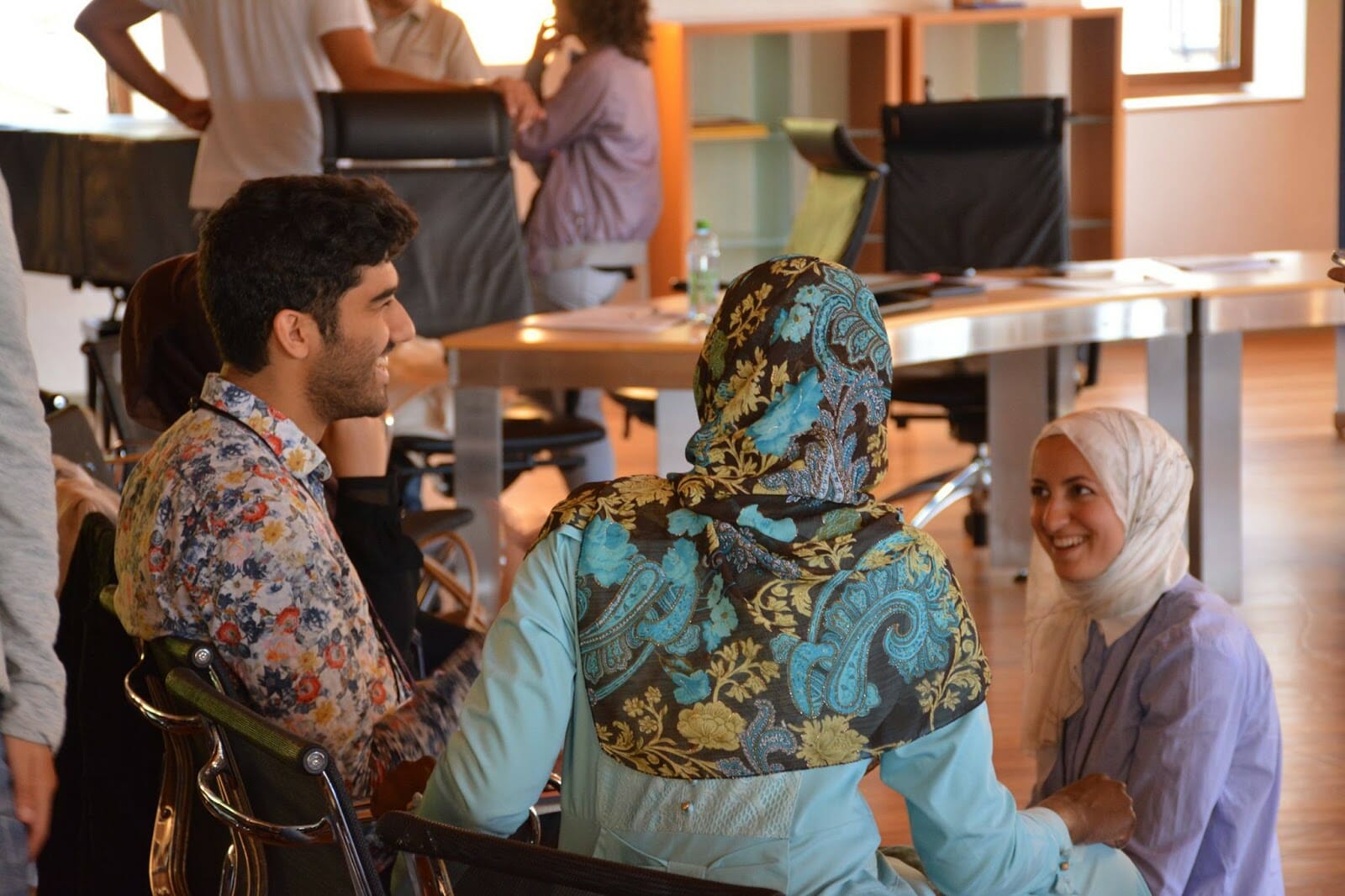 The Summer School was held in Tonadico in the Dolomite Mountains, not only due to the marvelous scenario of the locality, but also for the bond that existed between Chiara Lubich and those mountain districts. It was there, in fact, that in 1949 with some of her young companions, Chiara lived that mystic experience that is central to the history of the Work she had started. The idea of a summer school on “Religions in a global world” sparked up last April, at the end of an interdisciplinary seminar held at the Sophia University Institute. On that occasion a group of experts had started up an interdisciplinary, interreligious reflection (the scholars were Christians, Sciites and Sunnis Muslims, one was an expert on Buddhism and another, a lay thinker) and an intercultural event since there were also scholars from North Africa, Turkey, Iran, China and the USA, besides the European countries. The School program consisted of six general sessions, four of which were reserved for those who enrolled and two were open to the public. The one-to-one lessons were held after the work group discussions. T
The Summer School was held in Tonadico in the Dolomite Mountains, not only due to the marvelous scenario of the locality, but also for the bond that existed between Chiara Lubich and those mountain districts. It was there, in fact, that in 1949 with some of her young companions, Chiara lived that mystic experience that is central to the history of the Work she had started. The idea of a summer school on “Religions in a global world” sparked up last April, at the end of an interdisciplinary seminar held at the Sophia University Institute. On that occasion a group of experts had started up an interdisciplinary, interreligious reflection (the scholars were Christians, Sciites and Sunnis Muslims, one was an expert on Buddhism and another, a lay thinker) and an intercultural event since there were also scholars from North Africa, Turkey, Iran, China and the USA, besides the European countries. The School program consisted of six general sessions, four of which were reserved for those who enrolled and two were open to the public. The one-to-one lessons were held after the work group discussions. T he Sophia spirit lies precisely in uniting the dichotomy between life and thought, spiritual experience and scientific research. This perspective brought out the need to clarify how one’s personal comprehension of the truth harmonizes with that of people of other religions and cultures. A Slovak student highlighted how the research for knowledge can no longer be individual or monodisciplinary, but a community commitment that unites professors and students in the research efforts which should also be ,matched with a life commitment. Slowly, the participants managed to create a setting in which cultural contents and life perspectives harmonized, and solidified not only the traditional dichotomies, but also helped to break down cultural and religious barriers. Also the recreational moments were an occasion to deepen relationships, and delve into the deep differences in the worlds of each one, thus enhancing concrete dialogue where all is possible and sustainable. On the mountain peaks at 2,500 metres, the Christians gathered to celebrate Mass while the Muslims had their prayer rituals. At the closing of the School, the students all felt that they were bound by a sense of profound fraternity. The differences were still there, but now appeared as sources of mutual enrichment. On his way back, a young Shiite student wrote: “I would like to dedicate my first post on Facebook to the extraordinary group I was lucky to pass the Sophia Summer School with. I was able to present my faith in its authentic form, an opportunity that often is not possible in the light of the false image others often transmit of my religion. Likewise, I was also able to delve deeply into their lives, and in the faith of those I consider my brothers and sisters. The experience I had within the magical setting of the Dolomites, helped me to make a new discovery of the Catholic religion: I pray that we can continue this very important work. » Istituto Universitario Sophia
he Sophia spirit lies precisely in uniting the dichotomy between life and thought, spiritual experience and scientific research. This perspective brought out the need to clarify how one’s personal comprehension of the truth harmonizes with that of people of other religions and cultures. A Slovak student highlighted how the research for knowledge can no longer be individual or monodisciplinary, but a community commitment that unites professors and students in the research efforts which should also be ,matched with a life commitment. Slowly, the participants managed to create a setting in which cultural contents and life perspectives harmonized, and solidified not only the traditional dichotomies, but also helped to break down cultural and religious barriers. Also the recreational moments were an occasion to deepen relationships, and delve into the deep differences in the worlds of each one, thus enhancing concrete dialogue where all is possible and sustainable. On the mountain peaks at 2,500 metres, the Christians gathered to celebrate Mass while the Muslims had their prayer rituals. At the closing of the School, the students all felt that they were bound by a sense of profound fraternity. The differences were still there, but now appeared as sources of mutual enrichment. On his way back, a young Shiite student wrote: “I would like to dedicate my first post on Facebook to the extraordinary group I was lucky to pass the Sophia Summer School with. I was able to present my faith in its authentic form, an opportunity that often is not possible in the light of the false image others often transmit of my religion. Likewise, I was also able to delve deeply into their lives, and in the faith of those I consider my brothers and sisters. The experience I had within the magical setting of the Dolomites, helped me to make a new discovery of the Catholic religion: I pray that we can continue this very important work. » Istituto Universitario Sophia
Sep 20, 2015 | Non categorizzato
“I see and I find my own light in the other, the true Reality of myself, the real me in the other (perhaps buried or secretly disguised for shame), and once I have found myself, I am reunited by resurrecting myself.” Chiara Lubich, The Resurrection of Rome. “Mercy was the dough with which we kneaded our civilization in past centuries. Without knowing and loving mercy we do not understand the Bible, the Covenant, the book of Exodus, Isaiah, the Gospel of Luke, Francis of Assisi, Teresa of Avila, Frances Cabrini, Don Bosco, Christian social works, the Italian Constitution, the European dream, and life together and love affairs after the concentration camps, families living and staying together until the very end. It is mercy that matures and keeps up our relationships through time, it turns falling in love into love, sympathy and emotional accordance into big and strong projects, it makes our “forever’s” pronounced in youth become a reality, it prevents maturity and old age from becoming just a nostalgic story of broken dreams. Mercy lives of three simultaneous movements: the eyes, the bowel (rachàm in the Bible) and that of the hands, the mind and the legs. Those who are merciful are first and foremost people that are able to see deeper. The first instant of mercy is a look that reconstructs the moral and spiritual figure of the one that arouses mercy in us. Before acting to “take care of him,” the merciful one looks at him and sees him in a different way. The “not yet” is glimpsed beyond the “already” and the “has already been” appears to all involved. Prior to being an ethical action, mercy is a movement of the soul, with which I can see the other in their original design, before the error and the fall, and I love them in order to recreate their truer nature. Mercy can reconstruct the broken image in the soul, it can reconstruct the interrupted storyline. It can see that there is an inter-human solidarity that is deeper and truer than any crime, it believes that fraternity is not cancelled by any fratricide. It sees Adam again, even after Cain. And while it perceives purity in impurity, beauty in ugliness, light within the darkness, it also moves the body, and touches one in the flesh. The whole insides are moved. Mercy involves the whole body, it is a totalistic experience, something like the birth of a new creature – if there was no mercy, the experience of childbirth would remain totally inaccessible to us males; and yet we can understand something of this mystery, the greatest of all, when we give life mercifully. Mercy is something that is felt, it hurts, there is labour in it. It is an embodied experience, it is corporal. For this reason those who know mercy also know disdain: if I do not suffer viscerally from all the injustice and evil around me, I cannot be merciful. The same bowels are moved today by the indignation and anger in front of the children who died locked inside a lorry or drowned in the sea, and tomorrow the betrayal of a friend in need of forgiveness”. (Read more) by Luigino Bruni Published in Avvenire (Italian newspaper) on 06/09/2015

 “Real kindness is an exchange with essentially unpredictable consequences. It is a risk precisely because it mingles our needs and desires with the needs and desires of others...” A. Phillips e B. Taylor, On Kindness “Businesses and organizations are good places for a good and fulfilling life if and until they let non-economic virtues live alongside with the economic-business ones. It is a decisive co-existence that is not easy at all, because it requires managers to give up total control over the behaviour of people, to accept an element of unpredictability in their actions and to be willing to relativize efficiency, which is becoming the real dogma of the new religion of our time. Generosity is one of these non-economic virtues that, however, are also essential to every business and institution. The root of generosity lies in the Latin word genus, generis, a term that refers to race, family, birth – this is also the first meaning of the word gender. This ancient etymology – that is lost now – tells us important things about generosity. First of all it reminds us that our generosity has much to do with the transmission of life: with our family, with the people around us, with the environment in which we grow up and where we learn how to live. We receive it as an inheritance when we come into the world. It is a gift that our parents and relatives pass on to us. Generosity is formed inside the family home. The generosity we find in ourselves is very dependent on that of our parents, how and how much love there had been amongst them before we were born, the life choices they made and the ones they make when we start looking at them. It all depends on their faithfulness, their hospitality, their attitude to the poor, their willingness to “waste” time to listen to and help their friends, the love and respect they show towards their parents. This primary generosity is not a personal virtue, but a gift that becomes part of the moral and spiritual standard of what is called character. It is a capital with which we come to the world, which was formed before our birth and is nourished by the quality of relationships in the earliest years of our life. It also depends on the generosity of our grandparents, great-grandparents, neighbours, and that of many others who may not be contributing to our DNA but are still present, in mysterious but very real ways, in our own generosity (and non-generosity). My generosity is influenced by the poets who have nourished the heart of our family. By the prayers of my people, the musicians I love and listen to, by the storytellers in village festivals, by the speeches and actions of politicians, by the sermons of preachers. By the martyrs of resistance, who gave their life yesterday for my freedom today. By the generosity of countless women of the past centuries (there is a great affinity between women and generosity), that many times placed the flourishing of the family they gave birth to before their own – and still continue to do so. Generosity generates gratitude towards those who have made us generous by their own generosity. Living with generous people makes us more generous – and the same is true for prayer, music, beauty…. The cultivation of generosity produces many more effects than the ones we can see and measure – and the same goes for our non-generosity and that of others. The stock of generosity of a family, a community or a people is something like the sum total of the generosity of each and every member of it. Every generation increases or reduces the value of this stock, and the latter is happening today in Europe where our generation, impoverished in ideals and great passions, is squandering the wealth of generosity it has inherited. A state that leaves half of its young people without work is not a generous state”. (Read more) by Luigino Bruni published in Avvenire ( (Italian newspaper) on 23/08/2015
“Real kindness is an exchange with essentially unpredictable consequences. It is a risk precisely because it mingles our needs and desires with the needs and desires of others...” A. Phillips e B. Taylor, On Kindness “Businesses and organizations are good places for a good and fulfilling life if and until they let non-economic virtues live alongside with the economic-business ones. It is a decisive co-existence that is not easy at all, because it requires managers to give up total control over the behaviour of people, to accept an element of unpredictability in their actions and to be willing to relativize efficiency, which is becoming the real dogma of the new religion of our time. Generosity is one of these non-economic virtues that, however, are also essential to every business and institution. The root of generosity lies in the Latin word genus, generis, a term that refers to race, family, birth – this is also the first meaning of the word gender. This ancient etymology – that is lost now – tells us important things about generosity. First of all it reminds us that our generosity has much to do with the transmission of life: with our family, with the people around us, with the environment in which we grow up and where we learn how to live. We receive it as an inheritance when we come into the world. It is a gift that our parents and relatives pass on to us. Generosity is formed inside the family home. The generosity we find in ourselves is very dependent on that of our parents, how and how much love there had been amongst them before we were born, the life choices they made and the ones they make when we start looking at them. It all depends on their faithfulness, their hospitality, their attitude to the poor, their willingness to “waste” time to listen to and help their friends, the love and respect they show towards their parents. This primary generosity is not a personal virtue, but a gift that becomes part of the moral and spiritual standard of what is called character. It is a capital with which we come to the world, which was formed before our birth and is nourished by the quality of relationships in the earliest years of our life. It also depends on the generosity of our grandparents, great-grandparents, neighbours, and that of many others who may not be contributing to our DNA but are still present, in mysterious but very real ways, in our own generosity (and non-generosity). My generosity is influenced by the poets who have nourished the heart of our family. By the prayers of my people, the musicians I love and listen to, by the storytellers in village festivals, by the speeches and actions of politicians, by the sermons of preachers. By the martyrs of resistance, who gave their life yesterday for my freedom today. By the generosity of countless women of the past centuries (there is a great affinity between women and generosity), that many times placed the flourishing of the family they gave birth to before their own – and still continue to do so. Generosity generates gratitude towards those who have made us generous by their own generosity. Living with generous people makes us more generous – and the same is true for prayer, music, beauty…. The cultivation of generosity produces many more effects than the ones we can see and measure – and the same goes for our non-generosity and that of others. The stock of generosity of a family, a community or a people is something like the sum total of the generosity of each and every member of it. Every generation increases or reduces the value of this stock, and the latter is happening today in Europe where our generation, impoverished in ideals and great passions, is squandering the wealth of generosity it has inherited. A state that leaves half of its young people without work is not a generous state”. (Read more) by Luigino Bruni published in Avvenire ( (Italian newspaper) on 23/08/2015

 “Welcome, Holy Father” posters appeared all around the city already on Thursday. The taxi driver watching the Pope on TV was not indifferent: “So, you’re going to see the Pope tomorrow? Congratulations!” “Everyone finds the Pope appealing because he is authentic,” a non-Catholic man on the train said. He’s right: Francis does not need to attract attention or make himself appealing to all. And so he gave us a lesson before the UN’s General Assembly: on sustainable development, climate change and the issue of refugees: “We must not be appalled by the numbers… we have to look at their faces and listen to their stories,” he said in Washington. And at the
“Welcome, Holy Father” posters appeared all around the city already on Thursday. The taxi driver watching the Pope on TV was not indifferent: “So, you’re going to see the Pope tomorrow? Congratulations!” “Everyone finds the Pope appealing because he is authentic,” a non-Catholic man on the train said. He’s right: Francis does not need to attract attention or make himself appealing to all. And so he gave us a lesson before the UN’s General Assembly: on sustainable development, climate change and the issue of refugees: “We must not be appalled by the numbers… we have to look at their faces and listen to their stories,” he said in Washington. And at the 











